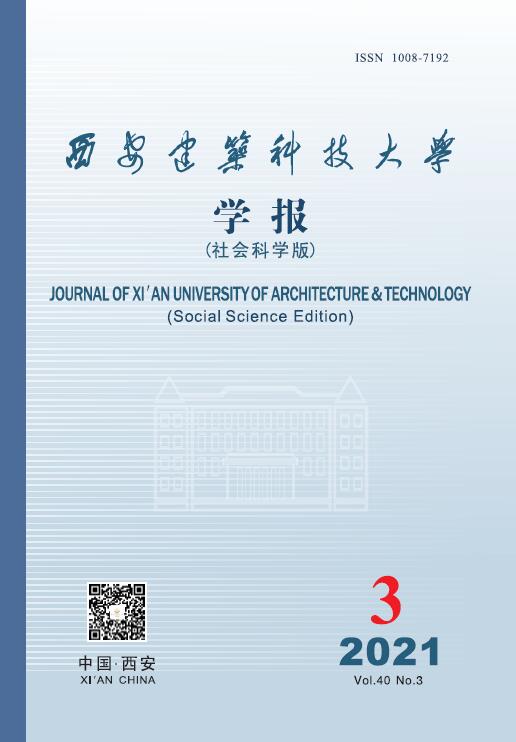(College of Humanities and Law, South China Agricultural University, Guang Zhou 510642,China)
Men Shi Xin Hua; elegant literary style; excellent artistic charm; use new words to express ideas written before
DOI: 10.15986/j.1008-7192.2021.03.011
备注
引言
《扪虱新话》是一部综合性著作,其内容或是经史著作的评考,或是诗文评点,或是对人物的逸闻轶事进行评论,被《四库全书总目》列在“子部”的“杂家”类,分上、下二集,各一百则。作者陈善,据李红英《〈扪虱新话〉及其作者考证》一文指出:“陈善子兼,福州罗源人,绍兴三十年(1160)进士。”[1]又云:“陈善应该是北宋末南宋初年人,约生活在徽、钦、高、孝四朝。”[1]至于版本,李红英《〈扪虱新话〉版本源流考》一文指出:“(《扪虱新话》)上述各种版本可从内容形式上归纳为两种:其一,不分类本,有南宋俞鼎孙、俞经编《儒学警悟》明抄本,今藏中国国家图书馆。其二,分类本,有四卷本、十五卷本之别。四卷本有明陈继儒编《亦政堂镌陈眉公普秘笈》刻本,今藏中国国家图书馆; 十五卷本又有足本、节本之分。”[2]吴文治先生主编的《宋诗话全编》从《扪虱新话》中辑出七十二则,命名为《陈善诗话》,包含了作者陈善一些独特的诗学观点,如“文中要自有诗,诗中要自有文”[3]5555等。然而《四库全书总目提要》却对《扪虱新话》有明显的不满,《提要》云:“……持论尤多蹖驳。大旨以佛氏为正道,以王安石为宗主。故于宋人诋欧阳修,诋杨时,诋欧阳澈,而苏洵、苏轼、苏辙尤力,甚至议辙比神宗于曹操。……观其书颠倒是非,毫无忌惮,必绍述余党之子孙,不得志而著书者也。”[4]1093《四库全书总目提要》此论未公,陈善的政治态度或与元祐旧党不同,但论诗绝非以王安石为宗主,更未力诋欧阳修、苏轼等人之诗,反倒对欧、苏推崇有加。因此,评价《扪虱新话》应持辩证态度,客观地分析《扪虱新话》的诗学观点。蔡镇楚先生在《中国诗话史》中论及南宋前期的诗话著作时指出:“值得提及的还有黄彻《巩溪诗话》、朱弁《风月堂诗话》、陈善《扪虱新话》、吴聿《观林诗话》、吴沆《环溪诗话》等。”[5]114这种观点值得重视。
目前,对《扪虱新话》的研究成果包括对作者、版本的考证和诗歌理论研究两大方面。在作者与版本源流考证方面,有李红英的《〈扪虱新话〉及其作者考证》《〈扪虱新话〉版本源流考》和陈名琛的《去伪存真〈扪虱新话〉作者考》。诗歌理论研究方面,则有杨胜宽先生的《陈善论杜:重韵与重格》论述了陈善重视“韵胜”与“格高”的诗学观; 吴晟先生的《陈善对黄庭坚诗学的评价与鼓唱》多层面地分析了陈善对黄庭坚诗学的态度。以上二文均对《扪虱新话》中诗学观的某一方面进行了研究。还有袁咏心《〈扪虱新话〉及其体现的宋代文人的文学观》和张俊海《〈扪虱新话〉的诗学观》,二文论述了《扪虱新话》的部分诗学观,未形成系统。
本文拟在上述诸文的基础上,以《宋诗话全编》所收录的七十二则内容为研究对象,各则的次序以《宋诗话全编》的编排为准,并辅以《扪虱新话》的其他内容(以《扪虱新话评注》为本)。从“格韵”论、创作论、文体论、鉴赏论等方面系统论述《扪虱新话》所体现的与众不同的诗学思想。
1 论诗的本质:“韵胜”与“格高”
《扪虱新话》对诗歌本质的认识并不是一成不变的,“韵胜”与“格高”是陈善在不同时期所推崇的两种标准,前期推崇“韵胜”,后期则补充了“格高”。两者的共同之处在于陈善追求的诗歌境界是独一无二、不可替代的。同时,陈善拈出“格”“韵”二字,在宋代论诗者中也是少见的。
1.1 重“气韵”《扪虱新话》开篇第一则名为“文章以气韵为主”,陈善曰:“文章以气韵为主,气韵不足,虽有辞藻,要非佳作也。”[3]5553这一诗论与唐代张彦远的画论“若气韵不周,空陈形似,笔力未遒,空善赋彩,谓非妙也”[6]13如出一辙,即都认为一篇作品即使具备华丽的辞藻、严谨的结构等形式,倘若内里气韵不足,便称不上佳作。气韵之重要,由此可见一斑。
陈善说:“予每论诗,以陶渊明、韩、杜诸公皆为韵胜。”[3]5569然则何为“韵胜”?从陈善所论,可以分为三种类型。
第一种是不太讲究诗歌艺术技巧的陶渊明诗。陈善曰:“乍读渊明诗,颇似枯淡,久久有味。东坡晚年酷好之,谓李杜不及也。此无他,韵胜而已。”[3]5553他认为看起来很平淡的陶渊明诗之所以比其他诗有味,便是胜在暗含气韵。陶渊明的“霭霭远人村,依依墟里烟。狗吠深巷中,鸡鸣桑树颠”[3]5554就是韵胜之作,表现了自然之境,可与《诗经·豳风·七月》相表里。陶渊明诸作以白描为主,不像谢灵运等人讲究拟人、对偶等技巧,也没有华丽的辞藻,之所以产生“久久有味”的感觉,便在于《后山诗话》指出的“渊明不为诗,写其胸中之妙尔”[3]1017。
第二种是很不符合诗歌艺术规范的韩愈诗。据魏泰《临汉隐居诗话》记载,韩诗被沈括称为“押韵之文耳”[3]1212,但在陈善看来,“自有一番风韵”[3]5553-5554。如《庭楸》诗:“朝日出其东,我常坐西偏。夕日在其西,我常坐东边。当昼日在上,我坐中央焉。”看似语无工夫,只用了一些平常语词,不事雕琢,却以“韵”胜,表现了与庭楸时时相伴,不可须臾分离的深情,而且“朝日”“夕日”“昼日”还有隐喻之义,从而营造出意味浑厚的境界。
第三种是“韵胜”的典范,即重视艺术锤炼的杜诗。陈善以北宋石延年《古松》的“影摇千丈龙蛇动,声撼半天风雨寒”两句与杜甫《古柏行》中的“霜皮溜雨四十围,黛色参天二千尺”做比较,认为石延年之作虽然“如富家子弟”[3]5554,即对仗工整,且气势逼人,但只追求险怪,没有深远的寄托,所以“未免俗耳”[3]5554,即缺乏内在的气韵; 相比之下,杜诗不仅仅在对偶方面下工夫,更重要的是托物言志,隐隐以古柏自况。杜甫以夸张的笔触表现了古柏高大粗壮的外形,与结尾的“古来才大难为用”呼应,不难发现,古柏除了外观魁梧挺峙之外,更重要的是内蕴冲天之志,内外结合,营造出吞吐风云之气象,寄托作者之志,所以陈善认为“气韵不侔”[3]5554。
总而言之,陈善说的“气韵”,应理解为“文章的韵味”,是诗歌中的一种浑融的意境。意境并不排斥技巧,但重点在于“意”,而非技巧。
1.2 诗要“韵胜”更要“格高”陈善起初推崇“气韵说”,然而在他写下“文章以气韵为主”的八年之后,对诗歌风格的标准又更上了一层,开始推崇“格高”说。这一转变主要受友人林倅的启发,诗话第四十五则“诗有格高有韵胜”云:
予每论诗,以陶渊明、韩、杜诸公皆为韵胜。一日,见林倅于径山,夜话及此。林倅曰:“诗有格有韵,故自不同。如渊明诗,是其格高; 谢灵运‘池塘生春草'之句,乃其韵胜也。格高似梅花,韵胜似海棠花。”于时听之,矍然若有所悟。自此读诗顿进,便觉两眼如月,尽见古人旨趣。然恐前辈或有所闻[3]5569。
陈善听了林倅的一席话,悟出渊明诗不仅“韵胜”,更是“格高”。所谓“格”指作品的整体品格与风貌,“格高”即作品的立意高远,品格不凡,呈现出由内到外的动人风貌。此处的“格”与前文所述的“韵”有所不同,“韵”的重点在审美效果; 格还强调文品与人品的统一。这里陈善做了一个形象的比喻,以海棠喻“韵胜”,以梅花喻“格高”,这本身就有高低之分。海棠花有“花中贵妃”之美誉,将韵胜之诗比喻为艳丽高雅的海棠花,喻指诗歌中所描绘的意境不仅优美,而且含蓄不尽。然而海棠虽美,仅有富贵之气。相比之下,梅花的品格更高一筹,乃“花中君子”,有着“凌寒独自开”“众芳摇落独暄妍”“冰雪林中著此身,不同桃李混芳尘”的傲骨。谢灵运的名句“池塘生春草,园柳变鸣禽”以自然凑泊而著称,然而谢灵运本人为性偏激,多愆礼度,常怀愤愤,其“进德智所拙,退耕力不任”与“种豆南山下”“不戚戚于贫贱,不汲汲于富贵”的陶渊明不可同日而语。所以“池塘生春草”止于“韵胜”,而陶渊明的“采菊东篱下,悠然见南山”等作品才是真正的“格高”之作,在带来审美感受的同时,还向读者展示了陶渊明淡泊名利、洒脱自然、率真自得的品性。从此陈善论诗达到了新的高度,不仅可以重视诗的气韵,更重视诗的品格,从此更推崇“格高”之诗。
2 创作论
陈善虽然最重视“韵胜”与“格高”,但也没有因此忽视诗歌创作的方法技巧。陈善论创作技巧,有一些观点继承了江西诗派,但又能够提出自己新的体会。下文将从立意、“夺胎换骨”法、谋篇布局、斟酌与锤炼等几个方面论述陈善追求技巧创新的诗歌创作观。
2.1 追求新的立意文章的创新,首先在于立意别具一格,卓尔不凡。诗话第七十一则“文章关纽”曰:“文章要须于题外立意,不可以寻常格律而自窘束。东坡尝有诗曰:‘论画以形似,见与儿童邻。作诗必此诗,定非知诗人。'此便是文章关纽也。”[3]5578苏轼强调吟诗作画需突破形似,陈善总结为“需题外立意”,关键在于摆脱寻常条条框框的束缚。所谓寻常格律,可为日常的创作提供基本规范。但若过分强调,则会导致墨守成规,乃至千篇一律。因此,无论是作诗还是作画,若要别出机杼,都应当跳出那些或有形或无形的框框,于框外独辟蹊径。诗画本一律,作画不求形似而求神似,作诗不传言内之意,而是传言外之意。陈善继而总结道:“予亦尝有和人诗云:‘鲛绡巧织在深泉,不与人间机杼联。要知妙在笔墨外,第一莫为醒者传。'窃自以为得坡公遗意,但不知句法古人多少?”[3]5578他提出“妙在墨外”,打破陈规,追求类似“鲛绡织泉”的神来之笔。
陈善的创新,最强调逆向思维。他说:“文章难工,而观人文章,亦自难识。知梵志翻着袜法,则可以作文; 知九方皋相马,则可以观人文章。”[7]151这里列举的唐代俗体诗僧王梵志,他穿袜子的方式与众不同,是内外反着穿的。有人向其指出穿反了,王梵志却说:“梵志翻着袜,人皆道是错。乍可刺你眼,不可隐我脚。”[8]760古人的袜子表面是光滑的,里面是粗糙的,世人为了好看往往将光滑的一面穿在外面。王梵志反其道而用之,宁可让人看不顺眼,也不能委屈了自己的脚,这实则是一种富有创造性的反向思维。将“翻着袜法”运用于创作上,往往因其不合常规,而别出新意,令人耳目一新。
第七十二则“王右丞画渡水罗汉”,进一步强调立意方面的逆向思维。本则云:
王右丞作雪里芭蕉,盖是戏弄翰墨,不顾寒暑。今世传右丞所画渡水罗汉,亦是意也。而山谷云:“阿罗皆具神通,何至拖泥带水如此?使右丞作罗汉画如此,何处有王右丞耶?”山谷意以为右丞当画罗汉,不当作罗汉渡水也。然予观韩子苍题孙子邵《王摩诘渡水罗汉》诗云:“问渠褰裳欲何往?仓惶徙以沧江上。至人入水固不濡,何以有此恐怖状?我知摩诘意未真,欲以笔端调世人。此水此渡俱非实,摩诘亦未尝下笔。”以此观之,古人作画自有指趣,不知山谷何为作此语?岂犹未能玩意笔墨之外耶?[3]5578
王维的作画方法正能体现不拘一格的创新,他的《雪里芭蕉》将生长在南方的芭蕉画在大雪纷飞的寒冬里,《渡水罗汉》画神通广大的罗汉却需渡水且有惊惧貌,皆是突破人们的常规思维,以陌生化的手法创作出一幅幅独具匠心、不落窠臼的伟大作品。绘画的创作经验,可以借鉴于诗歌创作之中。黄庭坚对“渡水罗汉”的批评,说明他还拘泥于传统思维,未能品味画外之意。韩驹才是王维的知音,他指出王维的作意在于调弄世人,寓谐隐之意,实则江水与渡口都不必应以实物,关键在品悟王维的墨外妙趣。罗汉如常人一样,亦有喜怒哀乐,面对滔滔江水,也会惊惶失措。王维便以这种游戏笔端带给观画者不同凡响的谐趣感受。艺术真实不同于生活真实,这才是王维的成功之处。
2.2 学古与创新(1)学习古人。陈善论诗,受苏黄诗风的影响,首先强调学习继承古人的重要性。第二十九则“韩文杜诗无一字无来处”云:“文人自是好相采取,韩文杜诗,号不蹈袭者,然无一字无来处。乃知世间所有好句,古人皆已道之,能者时复暗合孙吴尔。大抵文字中,自立语最难; 用古人语,又难于不露筋骨,此除是具倒用大司农印手段始得。”[3]5563这里陈善沿用了北宋以来“无一字无来处”的创作主张,指出“自立语最难”“世间所有好句,古人皆已道之”,因此不得不与古人“暗合”。然而陈善并没有局限于一味沿袭模仿,他指出“用古人语,又难于不露筋骨”,不主张直接沿用,而是要“不露筋骨”式地进行改造,融化成自己的语言。
在第三十一则“论苏黄文字”中,陈善指出,像苏轼此类近似天才的诗人,也强调向古人学习。本则云:
东坡常教学者但熟读《毛诗·国风》与《离骚》,曲折尽在是矣。又或令读《檀弓》上下篇。鲁直亦云:“文章好奇,自是一病。学作议论文字,须取苏明允文字观之,并熟看董、贾诸文。”又云:“欲作《楚辞》,追配古人,直须熟读《楚辞》,观古人用意曲折处讲学之,然后下笔。”[3]5564
从苏轼、黄庭坚所言可知,创作诗文,来自平时大量的阅读积累。这并不仅仅是熟读熟记万卷书,而且要对经典作品时时分析揣摩,掌握构思的巧妙之处,并将其内化于心,在自己创作的时候能得心应手地应用于外。
当然,学前人之诗,不应只求相像,而应自立门户,否则只能步人后尘,仰人鼻息。
(2)强调创新。在学古之外,陈善更重视创新,第六十八则“右军书东坡字鲁直诗”云:
右军书本学卫夫人,其后遂妙天下,所谓风斯在下也。东坡字本出颜鲁公,其后遂自名家,所谓青出于蓝也。黄鲁直诗本是规模老杜,至今遂别立宗派,所谓当仁不让者也。若乃学退之而不至者为孙樵,学渊明不至者为白乐天,则又所谓减师半德也[3]5577。
这里陈善强调,学习古人之后不仅要自出新意,而且应当自成一家。他首先列举了学古人而不至的失败例子。如晚唐孙樵曾说自己作文的真诀来源于韩愈,自诩已得韩愈之真传。然而陈善观樵之文后曰:“樵之文,实牵强僻涩,气象绝不类韩作,而过自称许。嫫母捧心,信有之矣。”[7]22孙樵学韩,并未到家,便自夸出于名门之下,是典型的反面例子。
接下来,陈善列举了正面例子,他提到的王羲之与苏轼的书法、黄庭坚的诗歌,未必青出于蓝而定胜于蓝,但别立宗派是毫无问题的,尤其是黄庭坚通过学习杜甫而引领了江西诗派,对当时的诗歌创作有启示意义。
(3)如何创新——“夺胎换骨”法。“夺胎换骨”法出自宋代释惠洪《冷斋夜话》所记载的黄庭坚语:“诗意无穷,而人之才有限。以有限之才,追无穷之意,虽渊明、少陵,不得工也。然不易其意而造其语,谓之换骨法; 窥入其意而形容之,谓之夺胎法。”[9]5“换骨法”即在不改变诗歌原意的基础上,另用自己的语言来表达同样的内涵; 而“夺胎法”是探究出诗歌的意思,然后赋予它更深刻的内涵。这“夺胎换骨”法为陈善所认可,他在第二十二则“文章有夺胎换骨法”云:“文章虽要不蹈袭古人一言一句,然古人自有‘夺胎换骨'等法,所谓灵丹一粒,点铁成金也。”[3]5561“灵丹一粒,点铁成金”原是黄庭坚语(见《答洪驹父书》),陈善借用黄庭坚之语强调了夺胎换骨法的神奇巧妙的效果。
陈善列举了欧阳修的《祭苏子美文》作为例子,他认为文中的“子之心胸,蟠屈龙蛇,风云变化,雨雹交加。忽然挥斥,霹雳轰车,人有遭之,心惊胆破,震汗如麻。须臾霁止,而四顾百里,山川草木,开发萌芽。子于文章,雄豪放肆,有如此者,吁可怪耶!”并非欧阳修独创,而是受了黄梦升为他的侄子黄庠作的祭文“子之文章,电击雷震。雨雹忽止,阗然灭泯”等几句的启发。欧阳修因为很喜欢这几句,时常诵之,所以将其加以改造,用在了自己的祭文之中。陈善评价黄梦升之文云:“梦升所作,虽不多见,然观其词句,奇倔可喜,下得所谓千兵万马之意。”[3]5561接下来陈善论述欧阳修对其的改造云:“及公增以数语,而变态如此,此固非蹈袭者。”[3]5561黄梦升的原作只有四句,将侄子黄庠的文章比作风雨雷电,忽而震天动地,忽而戛然而止,比喻贴切之余给人以奇特的感受。欧阳修同样是作祭文,在黄梦升文的基础上加以更具体的描写,开头直接点出了苏舜钦心胸不凡,变化万千,这是黄文不具备的; 中间以雨雹之势形容苏舜钦诗文的气势,也比黄文更加具体; 结尾更是总结了苏舜钦文章风格的“雄豪放肆”,亦为黄文之所无。凡此种种,较之黄文,内涵更为深刻,是“窥入其意而形容之”的典范。因此陈善总结道:“前辈作者用此法,吾谓此实不传之妙,学者即此便可反隅矣。”[3]5561此所谓以夺胎换骨之法达到点铁成金的效果也。
第四十则话及“咏梅”时,指出陈与义亦善“夺胎”之法。本则云:
客有诵陈去非墨梅诗于予者,且曰:“信古人未曾到此。”予摘其一曰; “‘粲粲江南万玉妃,别来几度见春归。相逢京洛浑依旧,只是缁尘染素衣。'世以简斋诗为新体,岂此类乎?”客曰:“然。”予曰:“此东坡句法也。坡梅花绝句云:‘月地云阶漫一樽,玉儿终不负东昏。临春结绮荒荆棘,谁信幽香是返魂。'简斋亦善夺胎耳。”[3]5568-5569
文人描写美人,常以花喻人,而陈与义反其道而行之,在《和张规臣水墨梅五绝》以美人喻花,即以女性之白净美丽来喻指梅花,将梅花称为“玉妃”,世人多认为陈与义此法新颖。然而陈善指出,陈与义此诗对苏轼的《次韵杨公济奉议梅花》有所借鉴,东坡诗中“玉奴”指南齐的东昏侯妃潘氏,其小字为玉儿。苏轼以潘妃之似雪肌肤喻指梅花,又以妃子之灵魂喻指梅花之香气。陈与义大概受此启发,将梅花与妃子联系起来,将其称为“玉妃”,而且又以“夺胎换骨法”进行改造。同样是以美人喻花,与苏诗不同,陈与义不仅借妃子来喻雪白的梅花,又想象梅花由江南客游至洛阳城,如同陆机所说的“京洛多风尘,素衣化为缁”一样,被缁尘染黑了素衣,从而成了张规臣画笔下的“墨梅”。以此独特的构思咏墨梅,予人新颖之感,出于苏诗并高于苏诗,而且不露痕迹,因此陈善谓陈与义亦善“夺胎”。
2.3 谋篇布局第五十七则“文章需宛转回复首尾俱应如常山蛇势”论及诗歌的章法,谈到了“曲折成章”的问题。本则云:
桓温见《八阵图》曰:“此常山蛇势也。击其首则尾应,击其尾亦首应,击其中则首尾俱应。”予谓此非特兵法,亦文章法也。文章亦要宛转回复。首尾俱应,乃为尽善。山谷论文亦云:“每作一篇,先立大意,须曲折三致意,乃成章尔。”此亦常山蛇势也[3]5574。
黄庭坚意思是说诗歌的篇章结构要变化多端,不可一味平铺直叙,乃至于千首一律。陈善沿袭了这种看法,并进一步强调诗歌是一个整体,不但要首尾呼应,任何一部分都与其他部分存在有机联系,互相呼应。
在此基础上,第五十三则“作诗如作杂剧,临了打诨方是出场”进一步强调了诗歌结尾的点题作用。本则云:
山谷尝言:“作诗正如作杂剧,初时布置,临了须打诨,方是出场。”予谓杂剧出场,谁不打诨,只是难得切题可笑尔。山谷盖是读秦少章诗,恶其终篇无所归,故有此语。然东坡尝有《谢赐御书》诗曰:“小臣愿对紫薇花,试草尺书招赞普。”秦少章一见便曰:“如何便说到这里?”少章之意,盖谓东坡不当合闹,然亦是不会看杂剧也。据坡自注云:“时熙河新获鬼章,是日泾原复奏夏贼数十万人皆遁去,”故其诗云:“莫言弄墨数行书,须信时平由主圣。犬羊散尽沙漠空,捷烽夜到甘泉宫。似闻指挥筑上郡,已觉谈笑无西戎。”乃知坡诗意自有在[3]5571。
黄庭坚以杂剧为喻,不仅强调了作品整体“布置”(也就是“谋篇布局”)的重要性,更强调了结尾之处应该回环点题。陈善进一步强调,这个道理谁都懂,关键在于这点题之笔能否起到画龙点睛式的作用。黄庭坚与陈善都将秦观的弟弟秦觏作为反面例子。苏轼的七言古诗《九月十五日迩英讲论语终篇……》,开头提到了迩英殿的环境,介绍了《论语》的文化与艺术价值,并进一步描述了讲解完毕后诸臣侍宋哲宗饮宴的场景,以及宴毕哲宗以御书赐宰相的举动,赞颂了哲宗书法之妙。诗篇就是这样一点一点地展开的,但如果文意止于此,则只是一首普通的应制之诗,平铺直叙,了无深意,更乏新意。于是苏轼将诗的主题转向时事,恰好近日闻报熙河大捷,生俘敌酋鬼章,因此苏轼借题发挥,由哲宗的书法之精巧转向治国之圣睿,概括了大破西戎的辉煌经历。结尾二句“小臣愿对紫薇花,试草尺书招赞普”,继续申明此意,在熙河大捷的基础上不战而屈人之兵,招吐蕃赞普来降。从诗歌立意层面,可谓继往开来; 从诗歌欣赏的角度,又含不尽之意于言外。这比黄庭坚说的“临了打诨”更具有阐发题意之功。若如秦觏所见,非但是“不会看杂剧”,而且正犯了苏轼所言“作诗必此诗,定非知诗人”之病。
2.4 斟酌与锤炼第三十则“文贵精工”云:
世传欧阳公平昔为文,每草就纸上,净讫即黏挂斋壁,卧兴看之,屡思屡改,至有终篇不留一字者,盖其精如此。大抵文以精故工,以工故传远。三折肱始为良医,百步穿杨始名善射,其可传者,皆不苟者也。唐人多以小诗著名,然率皆旬锻月炼,以故其人虽不甚显,而诗皆可传,岂非以其精故耶?[3]5563-5564
精工之文,顾名思义即精致工巧之文。“精”与“工”二字里承载着作者的情感与心血,尤以“精”为甚。因为流传千古的佳作往往需要千锤百炼、精心创作。如上文所言,欧阳修即使躺在床上也不断地思索修改文章,有些作品甚至全部推翻重来,精心锤炼到了如此地步,甚是可敬。也正因为欧阳修作诗写文并不草草了事,而是研精覃思,故其诗文可传远并不足以怪矣。当然有些诗人如曹植七步成诗、王勃即席为赋,皆为一挥而就; 李白信手拈来、苏轼出口成章,无不一气呵成,或如这一则后文提到的杨亿,在投壶弈棋中挥翰如飞,他们的创作兴许并不需要斟酌锤炼便可流芳百世,然而此等天才终究是少有的。对于其他作者而言,哪怕是杜甫、韩愈之类,没有必要倡导、吹捧即兴创作,更不能一味追求快捷创作,否则流弊无穷。因此陈善更欣赏肯下苦功夫、经得住旬锻月炼的诗人。黄庭坚创导的江西诗派,强调“诗不厌改”,与欧阳修的创作理念一脉相承。
3 文体论
陈善在文体论方面也提出了独到的观点,主要体现在诗与文两种文体的互相借鉴方面。陈善之前的论者,多强调诗与文的区别,甚至反对两种文体的交融。陈善是宋代较早总结两种文体的关系并提出“诗文相生”观点的论诗者。
第五则“韩以文为诗,杜以诗为文”论述了诗文相通。本则云:
韩以文为诗,杜以诗为文,世传以为戏。然文中要自有诗,诗中要自有文,亦相生法也。文中有诗,则句语精确; 诗中有文,则词调流畅。谢玄晖曰:“好诗圆美流转如弹丸。”此所谓诗中有文也。唐子西曰:“古文①虽不用偶俪,而散句之中暗有声调,步骤驰骋,亦有节奏。”此所谓文中有诗也。前代作者皆知此法,吾谓无出韩杜。观子美到夔州以后诗,简易纯熟,无斧凿痕,信是如弹丸矣。退之《画记》,铺排收放,字字不虚,但不肯入韵耳。或者谓其殆似甲乙帐,非也。以此知杜诗韩文,阙一不可。世之议者遂谓子美无韵语殆不堪读,而以退之之诗但为押韵之文者,是果足以为韩杜病乎?文中有诗,诗中有文,知者领予此语[3]5555。
诗与文是两种不同的文体,模糊二者的界限,容易引起争议。如《后山诗话》引用了黄庭坚的言论道:“诗文各有体,韩以文为诗,杜以诗为文,故不工尔。”[3]1017但这并不意味着二者是截然对立的。陈善指出,在尊重诗文异体这一前提下,也应该看到诗与文这两种文体的相通之处,二者之间还有一层“相生”的关系,即互相借鉴对方的长处,甚至向对方渗透转化,形成“文中要自有诗,诗中要自有文”的局面,从而获得更绝妙的艺术效果。
过度地“以文为诗”,令诗歌高度散文化,反而失去诗歌本身的韵味。如韩愈的古体诗,大量地引入了古文的铺叙手法,并杂以议论,而且将诗歌五言句的“上二下三”句式变为散文的“上一下四”句式、将诗歌七言句的“上四下三”勉励式变为散文的“上二下五”句式,的确有些不妥。然而诗歌如果适度地吸取散文的技法,即“诗中有文”,则是一种有益的借鉴。杜诗是这方面的成功例子,特别是杜甫晚年到夔州以后的诗,句法简易纯熟,浑厚自然,不追求声律、对偶、词藻方面的刻意雕琢,将散文文法之精髓融入诗句之中。
过度地“以诗为文”,令散文高度诗歌化、格律化,使散文失去了自由奔放的特点。如杜甫为数不多的赋与文,亦像诗歌一样追求对偶,而且将诗歌跳跃性强的章法用在散文中,句法也像诗句一样不拘于正常的语序,经常出现省略句、倒装句、拗句。凡此种种,亦为一弊。然而散文适度地吸取诗歌的技法,也是不无禆益的补充。韩文则是这方面的范例,除了陈善提到的《画记》之外,许多作品具有很强的抒情性。杨景龙先生在《试论“以诗为文”》中指出:“韩愈在‘以文为诗'的同时‘以诗为文',论文主张‘气盛言宜',其文‘如长江大河,浑浩流转'的气势(苏洵《上欧阳内翰书》),与其诗‘如掀雷揭电,奋腾于天地之间'的风格是嘘息相通的(司空图《题柳柳州集后》)。”[10]又云:“韩文‘健笔陡起'的开头方式,如《送董邵南序》首句‘燕赵古称多感慨悲歌之士',《送孟东野序》首句‘大凡物不得其平则鸣',《送温处士赴河阳军序》首句‘伯乐一过冀北之野而马群遂空'等,也大有鲍照和李白歌诗一起‘发唱惊挺'之概。”[10]总而言之,韩文受诗歌的影响,形成了雄奇奔放而又流畅明快的风格。
所以,韩诗杜文或是反面之例,但杜诗韩文则是“诗文相生”的成功典范。陈善在这方面的总结,可谓在宋代文学批评中独具慧眼。
第十二则云:“以文体为诗,自退之始; 以文体为四六,自欧公始。”[3]5558除了诗、文互相影响之外,陈善还指出散文与骈文的相互影响关系。这种观点来自《后山诗话》所云“欧阳少师始以文体为对属,又善叙事,不用故事陈言而文益高”[3]1022。陈善在这一则虽然没有深入地论述,但发扬了《后山诗话》的观点,然而所论甚为精当。欧阳修是古文大家,在骈文创作中引入古文的句法,令骈偶的句式不局限于四言句与六言句,而是加入了许多长句; 同时句子结构也参照了散文的句法,甚至以虚字行气,又参以散文擅长的议论。凡此种种,使骈文进入到半骈半散的新阶段,创造了“宋四六”这一散文化的特殊骈文,影响了王安石、苏轼的骈文创作。从这一则中,可见陈善并不反对“以文体为四六”,这与陈善“诗文相生”的观念是一脉相承的。陈善不拘泥于成见,强调各种文体之间的互相借鉴,无疑是开明之论。
4 鉴赏论
在诗歌的鉴赏、评价方面,陈善也提出了许多有益的观点,并批判了前人在鉴赏、评价方面过于主观或机械的认识。
4.1 评价的主观性陈善在第六则“文章由人所见”中首先谈到了鉴赏评论都带有一定的主观性。本则云:
文章似无定论,殆是由人所见为高下尔。只如杨大年、欧阳永叔皆不喜杜诗,二公岂为不知文者?而好恶如此。晏元献公尝喜诵梅圣俞“寒鱼犹著底,白鹭已飞前”之句,圣俞以为“此非我之极致者”,岂公偶得意于其间乎?欧公亦云:“吾平生作文,惟尹师鲁,一见展卷疾读,五行俱下,便晓人深意处。”然则于余人当有所不晓者多矣。所谓文章如精金美玉,市有定价,不可以口舌增损者,殆虚语耶[3]5555-5556?
陈善首先提到了对他人诗评价的主观性问题,杨亿、欧阳修是著名诗文大家,然而二人皆不甚喜欢杜诗。这既不能说明杜诗价值不高,也不能说他们二人不懂诗,只是见解不同,喜好有异罢了。接下来,陈善指出另一个问题——甚至有读者与作者评价不一的现象。如晏殊非常喜欢梅尧臣的“寒鱼犹着底,白鹭已飞前”两句诗,而梅尧臣却认为这并非自己写得最好的诗句。可见,对诗文的鉴赏评价带有很强的主观性。但陈善强调,不能因此认为对文章的评判没有具体的标准,也没有统一的结论,真正有价值的文章经得起大众的检验。
4.2 论诗不可轻言优劣在上一则论述的基础上,陈善进一步提出了避免主观判断的观点,第十七则论述了“文字各有所主未可优劣论”。本则云:
“撒盐空中”,此米雪也; “柳絮因风”,此鹅毛雪也。然当时但以道蕴之语为工。予谓《诗》云:“如彼雨雪,先集维霰。”“霰”即今所谓米雪耳。乃知谢氏二句,当各有所谓,固未可优劣论也。东坡遂有“柳絮才高不道盐”之句,此是且图对偶亲切耳[3]5559-5560。
陈善认为若所言之物不同,更不可轻言优劣。《世说新语》记载的一则咏雪故事云:“谢太傅寒雪日内集,与儿女讲论文义。俄而雪骤,公欣然曰:‘白雪纷纷何所似?'兄子胡儿曰:‘撒盐空中差可拟。'兄女曰:‘未若柳絮因风起。'公大笑乐。”[11]72当时人们以谢安侄女道蕴之语为工,陈善在详细剖析后不认同这一观点。因为陈善认为二者所言各有所主,“撒盐空中”是米雪,“柳絮因风”是鹅毛雪,二者非同一物也。米雪正是《小雅·甫田之什·頍弁》所言“如彼雨雪,先集维霰”的“霰”,也就是雪珠、雪粒。下雪往往先下米雪,继而下鹅毛雪; 米雪落地就如同撒盐一般,因重量较大而直接落地; 鹅毛雪轻盈,随风飞扬,这景观本身就具有美感,并不完全是道蕴形容得美,鹅毛雪赋予了她一定的创作便利。谢安的侄子、侄女所言实则是二物,故陈善认为不可因此轻率地判定道蕴之语优,胡儿之语劣。陈善所论,能发前人之未见,令人称道。
4.3 不可因诗言酒妇人而定其识污下在第二十七则“诗人多寓意于酒妇人”中,陈善进一步批判了过于主观地评价作品的现象。本则云:
荆公编李杜韩欧四家诗,而以欧公居太白之上,曰:“李白诗语迅快,无疏脱处,然其识污下,十句九句言妇人、酒尔。”予谓诗者,妙思逸想所寓而已。太白之神气,当游戏万物之表,其于诗,特寓意焉耳,岂以妇人、酒能败其志乎?不然,则渊明篇篇有酒,谢安石每游山必携妓,亦可谓其识不高耶?欧公文字,寄兴高远,多喜为风月闲适之语,盖是效太白为之,故东坡作欧公集序,亦云“诗赋似李白”。此未可以优劣论也。黄鲁直初作艳歌小词,道人法秀谓其以笔墨诲淫:“于我法中,当堕泥犁之狱。”鲁直自是不复作。以鲁直之言能诲淫,则可; 以为其识污下,则不可[3]5563。
王安石编诗时,将李白排在最后,甚至列于欧阳修后面。他的根据在于李白诗的内容多涉及酒与妇人,从而断定李白思想庸俗。陈善反对这样的优劣论,他认为意象、题材的选取只是诗人为了更好地表现某种情绪,并非评价诗人思想高尚与否的标准。写酒与妇人,见识就浅俗、思想就污浊吗?写青山绿水、田园之风光,其人就必定淡泊名利、自然脱俗吗?非也。再进一步说,李白诗中的所谓“妇人”形象,要么是清新脱俗的采莲少女,要么是类似《古诗十九首》以来的“思妇”,乃出于“托物以讽”的需要。如果这也要否定,则《国风》《乐府》里咏少女多矣; 《离骚》《古诗》、曹植诸作,皆以美人怨妇喻已之怀才不遇,按此标准,可有立锥之地?再说“酒”类,除陈善提到的陶渊明之外,阮籍、刘伶、王绩皆为酒徒,其作品多言酒,亦要因此抹煞其情操而加以污名化?至于道人法秀对黄庭坚婉约词的批判,可看作“欲加之罪,何患无辞”。否则若此论成立,唐五代宋词完全可以从文坛中剔除。因此鉴赏诗文,不能因诗人所言之物不合自己的道德标准,便否定其作品,进而否定其人品,所咏之物与诗之优劣不可划等号。
4.4 不可文人相轻陈善进一步对“文人相讥”的风气作出了批判。第三十三则云:
东坡《醉白堂记》,荆公谓是韩白优劣论; 而荆公《虔州州学记》,东坡亦谓之学校策。范文正公《岳阳楼记》,或者又曰此传奇体也。文人相讥,盖自古而然。退之《画记》或谓与甲乙帐无异。白乐天《长恨歌》曰:“上穷碧落下黄泉,两处茫茫寻不见。”当是《目莲救母》辞尔。近柳屯田云“杨柳岸晓风残月”,最是得意句,而议者鄙之曰:“此梢子野溷时节也。”尤为可笑[3]5565-5566。
陈善所举的例子,要么是一二名句,本为传诵之作; 要么是全篇,或许有白璧微瑕。无论是整体还是部分,批评者并不关注作品的价值,抓住一些零星的瑕疵便大做文章,甚至毫无根据地予以全盘否定。对于这一类行为,陈善认为,文人相轻虽是自古而然,但决非有气度之举,仍不宜提倡。
4.5 理解不可过于拘泥除了一再指出不可以过于主观地评价作品之外,陈善也对一些机械地理解作品、从而得出可笑结论的解读方式提出了批评。第五十五则“郑康成注《毛诗》牵合《周礼》沈存中论诗亦有此癖”云:
诗人之语,要是妙思逸兴所寓,固非绳墨度数所能束缚,盖自古如此。……近世沈存中论诗亦有此癖,遂谓老杜“霜皮溜雨四十围,黛色参天二千尺”为太细长。而说者辨之曰:“只如杜诗有云:‘大城铁不如,小城万丈余。'世间岂有万丈城哉?亦言其势如此尔。”予谓周诗云:“崧高维岳,峻极于天。”岳之峻亦岂能极天,所谓不以辞害意者也[3]5572-5573。
沈括竟然认为杜甫的“黛色参天二千尺”之句形容古柏过于细长,这正犯了孟子在《万章》篇中说的“说诗者不以文害辞,不以辞害意”[12]2735之病。若按沈括之法论诗,则“小城万丈余”的“万丈”岂不是过于失真?“崧高维岳,峻极于天”岂不是更无法接受?沈括囿于见识,无法接受并欣赏文学作品中常见的夸张手法。千尺之柏、万丈之城、极天之山不过是以夸喻手法言其气势如此罢了,又怎可只按照字面意思,以一尺一寸认真较量?这种毛病,孟子早就指出过:“《云汉》之诗曰:‘周余黎民,靡有孑遗。'信斯言也,是周无遗民也。”[12]2735由此可知,沈括无艺术匠心,以辞害意,过于受字面意思的束缚,以至不能很好地理解言外之意,因此陈善断为“绳墨度数所能束缚”。
5 结 语
综上所述,《扪虱新话》体现了陈善多方面的诗学思想。在风格论上,他推崇格高与韵胜之作,最能代表这类风格的作品是陶潜与杜甫诗。在创作论上,他认为作诗首先要强调构思立意,而且需懂得“夺胎换骨”法、要重视“谋篇布局”、好的作品大部分需要斟酌与锤炼,诗文能创新和脱俗更可贵。在鉴赏论上,他不主张轻易论诗文优劣,因为“文章由人所见为高下尔”以及“文字各有所主”。另外,陈善反对通过诗文表面描写的内容来断定诗歌的水平和诗人见识的高下。同时反对不够大度的文人相讥之风。在文体论上,陈善强调诗文相通,应该互借鉴,而非排斥。这些诗学观对于研究宋代诗学批评观念也有一定的参考价值。
注释:
① “文”原作“人”,据唐庚《眉山集·上蔡司空书》改。见《文渊阁四库全书》第1124册,上海:上海古籍出版社,2003年。
- [1]李红英.《扪虱新话〉》及其作者考证[J].中国典籍与文化,2002(1):45-51.
- [2]李红英.《扪虱新话》版本源流考[J].中国典籍与文化,2007(3):61-66.
- [3]吴文治.宋诗话全编[M].南京:凤凰出版社,1998.
- [4]永瑢等.四库全书总目[M].北京:中华书局,1965.
- [5]蔡镇楚.中国诗话史[M].长沙:湖南文艺出版社,2001.
- [6]张彦远.历代名画记[M].沈阳:辽宁教育出版社,2001.
- [7]陈善.扪虱新话评注[M].孙钒婧,孙友新,校注.福州:福建人民文学出版社,2014.
- [8]王梵志.王梵志诗校注[M].项楚,校注.上海:上海古籍出版社,1981.
- [9]惠洪.冷斋夜话[M].北京:中华书局.1985.
- [10]杨景龙.试论“以诗为文”[J].文学评论,2010(4):24-31.
- [11]刘义庆.世说新语校笺[M].徐震堮,校笺.北京:中华书局,1984.
- [12]阮元.十三经注疏[M].北京:中华书局,1980.
